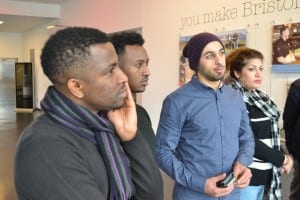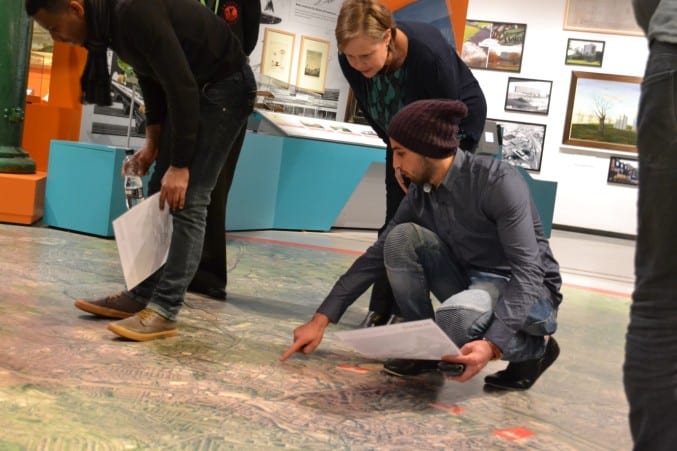English for Speakers of Other Languages at M Shed
Posted on by Fay Curtis.
Finn White, Engagement Officer – Communities
 Since December 2015, more than 180 ESOL (English for Speakers of Other Languages) students have visited M Shed for a whistle-stop journey through Bristol’s history. Students have come from all over the world: from Albania to Afghanistan, from Eritrea to East Timor.
Since December 2015, more than 180 ESOL (English for Speakers of Other Languages) students have visited M Shed for a whistle-stop journey through Bristol’s history. Students have come from all over the world: from Albania to Afghanistan, from Eritrea to East Timor.
On the tour, we cover Bristol’s manufacturing and trading past, the International slave trade and the history of protest. Part of the motivation for running this programme is to help recent migrants engage with their city and recognise that they too are now part of its rich history. I’ve found that the darker elements of the tour – surrounding protest and the international slave trade – are often the moments when students are most engaged. It’s perhaps reassuring for those arriving in Bristol (many fleeing war, famine and poverty) to realise that their newly adopted country also has a history of such bitter struggles.
Delivering ESOL to students can be challenging, due to the huge variety of educational backgrounds they might have. While there are, of course, lots of highly educated ESOL learners, many of those attending classes have had a fairly basic primary education and therefore have a relatively limited understanding of world history. Many of those on the tours have, for example, no knowledge at all that the international slave trade ever existed. Furthermore, over 40% of our ESOL visitors have never attended a museum of any kind before.
However, although this may be a challenge, it often leads to refreshingly sincere and immediate reactions to M Shed’s diverse exhibits. Among the many improbably wonderful bits of feedback we’ve received, was this from a Nepali teenager:
when you there [at M Shed] is the happy feeling that you never forget, this is going to be very important time in your life (sic).
This sort of reaction owes less to my superhuman engagement skills and more to the lack of exposure many migrant communities have had to the cultural life of the city. It shows the potential museums can have to empower, educate and welcome our newest citizens.
 Recently, we’ve seen these ESOL tours have an impact on the wider organisation, with five ESOL visitors becoming museum volunteers. With time, I hope Bristol’s migrant communities will see our museums as spaces that truly belong to them, and that we as an organisation will consider our diverse new audiences as an integral part of what and who we are. Early analysis shows that by targeting ESOL groups, we’re able to bring in audiences from our least engaged neighbourhoods.
Recently, we’ve seen these ESOL tours have an impact on the wider organisation, with five ESOL visitors becoming museum volunteers. With time, I hope Bristol’s migrant communities will see our museums as spaces that truly belong to them, and that we as an organisation will consider our diverse new audiences as an integral part of what and who we are. Early analysis shows that by targeting ESOL groups, we’re able to bring in audiences from our least engaged neighbourhoods.
I’m now developing two new ESOL tours: one will go behind-the-scenes at M Shed, while the other will use our art collections at Bristol Museum & Art Gallery to further spark language, debate and delight in our collections. The current tour finishes by considering how, for centuries, people have travelled from the far oceans to settle in Bristol. I hope that our visitors can see that they too are now part of the turbulent, fascinating history that as forever washed up on the muddy banks of the Avon.
To find out more or to book a tour, please feel feel to email me.